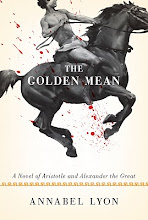I get asked a lot about
The Golden Mean's cover: what is with the naked guy on the horse? I can guess what my publisher was thinking (along the lines of "made you look!"), and certainly I love its Hellenic resonances - eros and thanatos and all that lovely marble statuary - but it does relate very directly to one character in particular in the novel.
Alexander had an older half-brother named
Arrhidaeus. The Roman historian
Plutarch, who wrote a canonical early biography of Alexander, claims Arrhidaeus became an "idiot" following a childhood illness, or perhaps poisoning. In my novel, he's suffered brain damage as a result of meningitis (though the ancient Greeks, of course, had neither of those terms).
His affliction didn't seem to make him any less of a threat to Alexander, who freaked out (another term the Greeks probably didn't have) when their father arranged a politically convenient marriage for Arrhidaeus to the daughter of the satrap of Caria. Thinking Philip was positioning Arrhidaeus for the throne, Alexander sent an intermediary to the satrap, offering himself in his brother's stead. When Philip found out, he had the intermediary (a popular tragic actor named Thettalus) paraded through the streets in chains, and banished most of Alexander's closest friends. The offer of marriage, obviously, was withdrawn.
Arrhidaeus did eventually become king, after Alexander's death, and ruled with what we can only assume was enormous assistance from the general Antipater.
In the novel, I imagine Aristotle tutoring both princes: Alexander out of duty, Arrhidaeus out of scientific curiousity. In an early scene, the philosopher discovers Arrhidaeus loves horses and decides to teach him to ride. Once mounted, Aristotle wants the boy to sit up straight.
"'No, no,' a groom who's been watching them says. 'Now you hug him,' and leans forward with his arms around an imaginary mount. Arrhidaeus collapses eagerly onto the horse's back and hugs him hard."




